Olympic bronze medalists Marcus Ellis and Chris Langridge talk to Badzine about their lives leading up to and since their Rio medals.
By Raphael Sachetat. Photos: Badmintonphoto
Badzine: When and how did you start to play?
Marcus Ellis: I started playing at a local club in my hometown Huddersfield
Chris Langridge: I started playing badminton at the age of ten, I was very fortunate that my school teacher at the time based in Fetcham, within the county of Surrey, was the county badminton coach. I went along with some of my friends to the school club, I found out two things fairly quickly: I progressed fairly quickly and really quite enjoyed playing. This led to the start of my badminton career.
Badzine: When did you realize you wanted to do this full time and how were you doing in youth tournaments?
Ellis: I went full time when I was 18, after realizing I couldn’t realistically get the best training and sparring whilst studying at university. Through juniors I was fairly dominant in the UK and around Europe in my own age group.
Langridge: I was sure when I was young that I was going to be a professional athlete. I just thought it would have been tennis as I started this at a very young age and found success. Only at the age of 15 or 16 did I realize it was likelier to be badminton. I had quite of bit of success on the European scene and even won a few European tournaments a few years young.
Badzine: What inspired you during all your years at Milton Keynes? Was there any player in particular within the UK? Coaches? Players abroad?
Ellis: I have many coaches to thank along the way, right from when I first started in Huddersfield to now at the national centre in Milton Keynes. Each and every single coach has had their input in one aspect or another and I feel lucky to have worked with such a range of quality coaches. Watching the Olympics always inspired me. Not just badminton but every sport. Being able to train with players like Nathan Robertson and Gail Emms when I first came to the national centre was amazing and they proved to players that it can be done.
Langridge: I was very lucky to have received coaching from many great coaches at the centre and each one of them has helped me to achieve my success. The big thanks will be to the current coaches who have helped me throughout most of my career. Jakob, who currently coaches us, has so much belief in us that it rubs off onto us. He is also one of the best people at planning and organizing things, especially in the build-up to major championships. Julian is a great motivator and can help when things become tough physically to help push you through. Pete likes to look at the smaller finer aspects. All together really help in moulding players
Badzine: How did you prepare for Rio? Did you think, at any point, that you could go home with a medal?
Ellis: Preparation for Rio went very well for both me and Chris. I think by the end of Olympic qualifying we needed a break that didn’t come for a while, with the European Championships and an Asia tour straight after. We had 7 weeks of fantastic preparation together with our coaches and we went to Rio confident and focused on what we needed to do. We never spoke of winning a medal but of course that was the dream. To perform how we did on the biggest stage, has proven to us that there is more to come.
Langridge: The preparation for Rio was very good, we had a very clear plan, and everything was very organized. We were very lucky that we were allowed to use the NIA (All England) to train in. Some foreign players came to train with us and the whole atmosphere and quality of training was high. We were also allowed to train in Denmark for a few days just before the Olympics. They have a lot of very good pairs, so match play was of a high quality.
The other more specific/individual areas will be kept a secret. The main aim for myself before going to the Olympics was to enjoy it, play well, and I aimed for the quarter-finals. Marcus and myself are quite a strange pair as it seems we have two levels: pretty good or a little up and down. When we were playing well we could be dangerous, so we did know that if we played to our best, there were not many pairs we couldn’t beat. If you were to have said, before I went to the Olympics, that I would win a bronze I probably wouldn’t have believed you.
Badzine: Could you explain in words what went through your mind the moment you won that match point for the bronze medal?
Ellis: Winning that bronze medal was completely overwhelming and emotional. After the last point me and Chris just looked at each other and couldn’t believe what we had just done. We almost didn’t think it could happen but now we have had time to digest it, we are very proud of what we achieved there and really hope that it has inspired the younger guys at the national centre that anything is possible.
Langridge: The moment the match ended it was pure shock, the thought going through my mind was quite simply: “What on Earth has just happened?” The next thing I knew we were doing a number of interviews and then the whole team jumping on us celebrating, it still has not sunk in properly.
Badzine: How has it changed your life since then?
Ellis: Life was very busy for a short time driving round doing lots of interviews with the TV and newspaper. I also took part in a few events that are trying to inspire children to play more sport, which I think was amazing. Me and Chris are both still quite busy with things like this and have had many people ask us to go to schools to speak but we are trying to get back to normal as our preparations start for the next tournaments.
Langridge: The medal has increased the media attention that badminton has in Great Britain as we have not had success in the men’s doubles at the Olympics before. The media attention for Marcus and myself has also increased, we are both very pleased that badminton has a chance to grow in Britain, as we are a very, very, very small sport here. The training is still as tough though.
Badzine: What are your sporting goals now? Is the target Tokyo 2020?
Ellis: It seems such a long way away to think about Tokyo in 4 years time but of course I would love to be there competing. It’s what every badminton player wants so I’ll be there!
Langridge: The main sporting goal is to keep up the current form we have. We need to consistently play well, which has been the part we have struggled with, often one good performance followed by a poor one. We both know how we can play. We need to bring that form to every tournament. I would love to go to another Olympics, especially in Tokyo as it is such an amazing place and it would be the most amazing Olympics as they would put on a truly amazing spectacle.
Badzine: What are your feelings about UK Sport’s decision to cut the funding for badminton?
Ellis: We are all devastated and surprised about the news we received in December from UK Sport saying they were going to cut all funding to Badminton effective from 1st April 2017. It has a huge impact on me personally but it also gives no chance to the younger players to make a career for themselves. Chris and I feel like it is a slap in the face after the amazing tournament we had in Rio. We exceeded the targets they set for us so we really don’t understand their decision. We are appealing and hope for a positive outcome but nothing will be clear until the end of February. For now, it’s just a waiting game for the players
Langridge: It’s devastating news for the sport as the money helped pay for all parts of the sport. The hardest thing about the decision for all of us was that we actually over achieved the target that was set for us, so it really feels like a dagger to the heart for all of us. There is an appeal which is being processed, but we won’t know the decision until the end of February probably and even if we win the appeal that does not change anything as they could still give us nothing at all. I really hope that we can find a solution, so all of us can continue to play the sport that we love.
Badzine: Could you each tell me something funny about your partner’s habits or things he does that can seem unusual, and mostly, could you describe your relationship, off–court?
Ellis: Chris’s habit is not unusual but he is always always late! Luckily, between us we haven’t missed a match yet! We have a great relationship on and off the court. Off court we can speak freely about anything, which is really important and on court, we know our roles and strengths which we always try to play within.
Langridge: Marcus is very easy-going. He doesn’t get annoyed easily. When he does, you know you’re in trouble. We have very similar ideas on a number of things so jell in most situations. I don’t think there is anything that he does that’s weird. He’s a tidy guy. The only thing I can think of is that his feet aren’t the sweetest smelling feet.
![Britain’s bronze medallists under the spotlight Olympic bronze medalists Marcus Ellis and Chris Langridge talk to Badzine about their lives leading up to and since their Rio medals. By Raphael Sachetat. Photos: Badmintonphoto Badzine: When and […]](http://www.badzine.net/wp-content/uploads/ngg_featured/20160819_1511_OlympicGames2016_Yves6500.jpg)
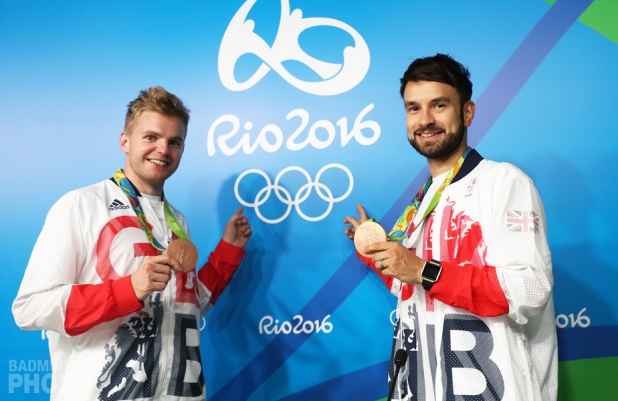
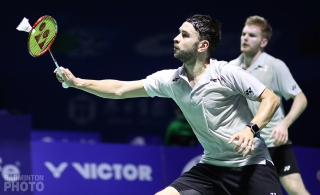

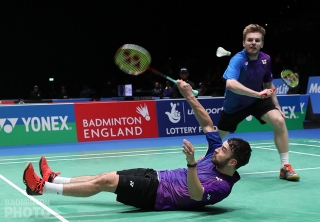
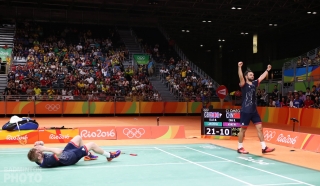
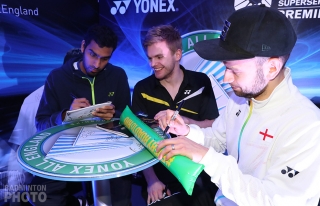
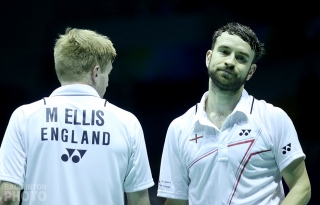


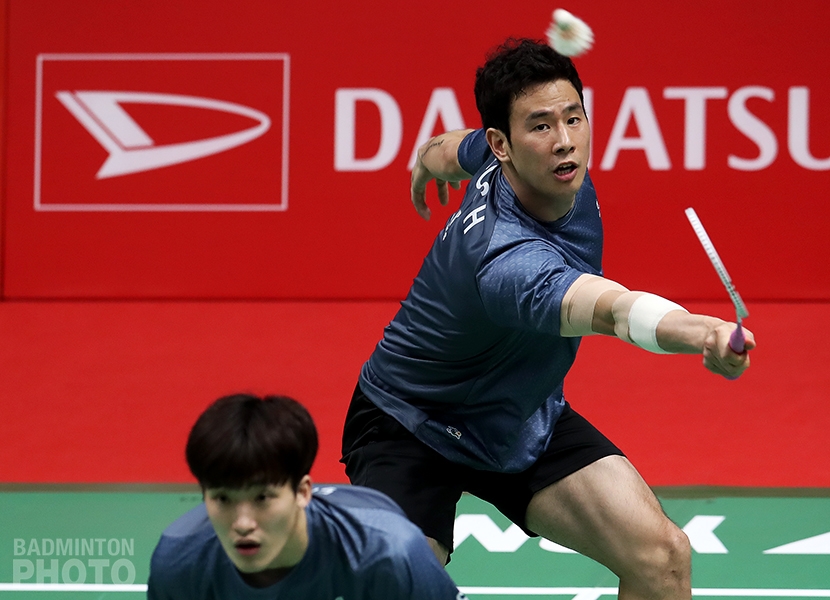
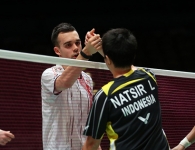
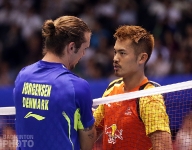
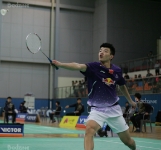
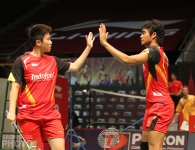
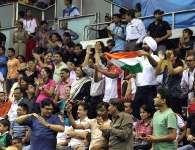
Leave a Reply